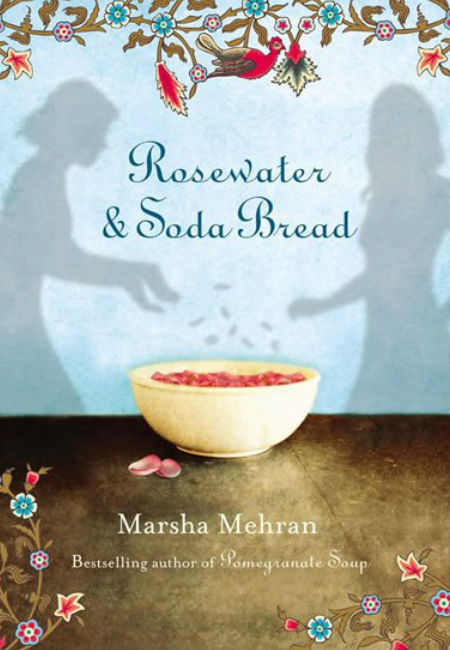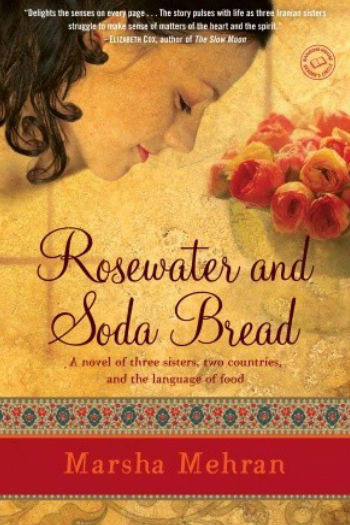New beginnings, truly new beginnings, are a rare thing in life.
Either they are not looked for at all by people caught in the slothful yet iron grip of the devil-they-know, or if time and circumstances do demand their provision, not granted by whatever mysterious powers in the universe grant such blessings.
When they are needed, and provided, they are a highly-valued thing indeed, a rare chance to reset the unforgiving passage of time in a way that will, hopefully – for even a gift as precious as this comes with no guarantees of success or happiness – remake lives in a more affirming, more nourishing and long-lasting form.
It’s a theme explored at length in the now sadly-departed Marsha Mehran‘s poetically evocative book Rosewater and Soda Bread, which explores in prose as rich, beautiful and pleasing as the food that fills its pages, what happens when three Iranian sisters, forced to flee their home country in the wake of the Shah’s toppling from power in 1979, end via up via London in the small wind and rain swept village of Ballinacroagh on Ireland’s rugged west coast in 1987.
“Marjan Aminpour slowly sipped at her hot tea and studied the changing horizon. Mornings in Ireland were so different from tjose of her Persian childhood, she thought, not for the first time. Were she still in the land of her birth, Marjan mused, daybreak would be marked by the crisp sounds of a sofreh, the embroidered cloth upon which all meals were enjoyed, flapping over a richly carpeted floor.”
The manner in which eldest sister Marjan, a woman deeply connected to the food she reverentially makes with its time-honoured links to community, memories and love, more conservative and deeply wounded Bahar, and free spirited teenager and baby of the family Layla come to be in a village as different from where they grew up as the cafe they establish is from the pubs that surround it, is proof that new starts in life are not random, unremarkable events.
Set up in the old building on the Main Mall that once housed the bakery of devoted Italian couple Estelle and Luigi Delmonico – Estelle now a kindhearted if lonely widow is the aunt of Marjan’s close friend in London – the Aminpour sisters’ Babylon Cafe, possessed of a name considered heathen in the extreme by the town’s purveyors of righteousness led by bitter, gossip-addicted Dervla Quigley, itself a new beginning, begets its own ripples of renewal through the staid and little-changing town.
Content to meander slowly and thoughtfully through the lives of the three sisters and the various townsfolk who largely see them as a blessing rather than Dervla’s much-opined curse, Rosewater and Soda Bread is that rare novel that doesn’t attempt to convey the idea that starting afresh in life in some kind of Pollyana-esque quick fix that will cure all your ills.
Certainly there is much more that goes right in the new home of Marjan and the sisters she so protectively shepherds through their new life than goes wrong with the cafe an almost immediate success, friendships formed beyond the nurturing motherly one with Estelle with the feisty hairdresser Fiona and the local Catholic priest-turned would be pirate radio host Father Mahoney, and a sense of belonging, both in the village and with potential new love interests and beliefs, making Ballinacroagh much more of a home than any of the sisters might have expected.
And throughout the book, which is suffused with the sense of joy that comes from holding fast to your traditions while exploring and adapting to your new home, there is a sense that for all the setbacks, past sadnesses and loss and hidden secrets, and there are many in the lives of Marjan and Bahar particularly, that life in this small County Mayo village represents the best chance for a fresh start in lives that have looked over and done with more than once.
Mehran bolsters this sense of rebirth and renewal with the almost magical tale of a “mermaid” who washes up on remote Clew Bay Beach in the country where she is rescued by Estelle who relishes the chance to bring nurture a lost soul, who shows all the signs of wanting to end it all, well and truly back into the land of the living.
Tacheen is a domed medley of baked saffron rice and chicken, forming the shape of a cathedral ceiling. On first glance, the dish looks curiously like chelow, plain steamed rice; it is only after slicing through its center that the layers of fortitude are exposed: first buttered rice and almonds, then fried chicken and sautéed spinach, the yogurt binding them into a brotherhood of delicious play. Tacheen.
Marjan by virtue of her close friendship with Estelle in sew drawn into caring for the young woman, an additional ball to juggle as she navigates how to best Layla’s burgeoning sexuality, Bahar’s newfound faith and her own nascent romance with the dashing, well-travelled and versed in Sufi poetry Julian Winthrop Muir.
Again and again, Rosewater and Soda Bread sings the virtues of allowing yourself to believe that life can begin again in ways and places you might not expect.
This hopeful but grounded message, and the lilting narrative that carries it is wrapped in language so beautifully formed and evocative that it is a joy to read each and every passage.
Words seems to dance off the page, all the characters and their struggles and joys, the places they inhabit, and especially Marjan’s love for the food she so lovingly tends coming alive, fully formed from the very first page, sweeping up your senses, your emotions and renewing that innate hope that we all have that life can be something more than what it has been up to this point.
It all adds up to a thoroughly immersive, richly-rewarding and gentle read, one that doesn’t move along at breakneck pace or with great import but nonetheless conveys a profound and world-altering sense that life can begin again if you’re simply willing to let it happen.

